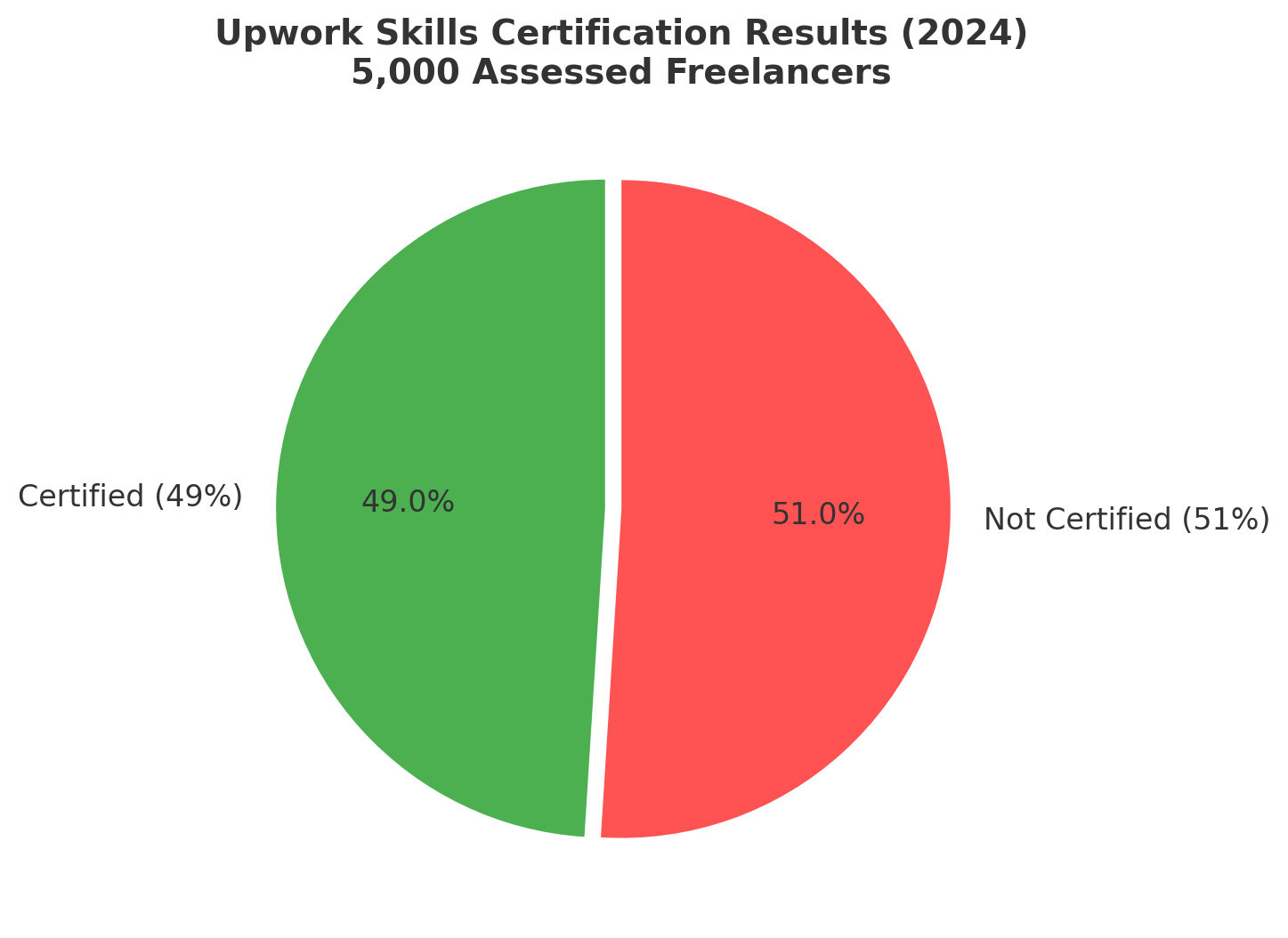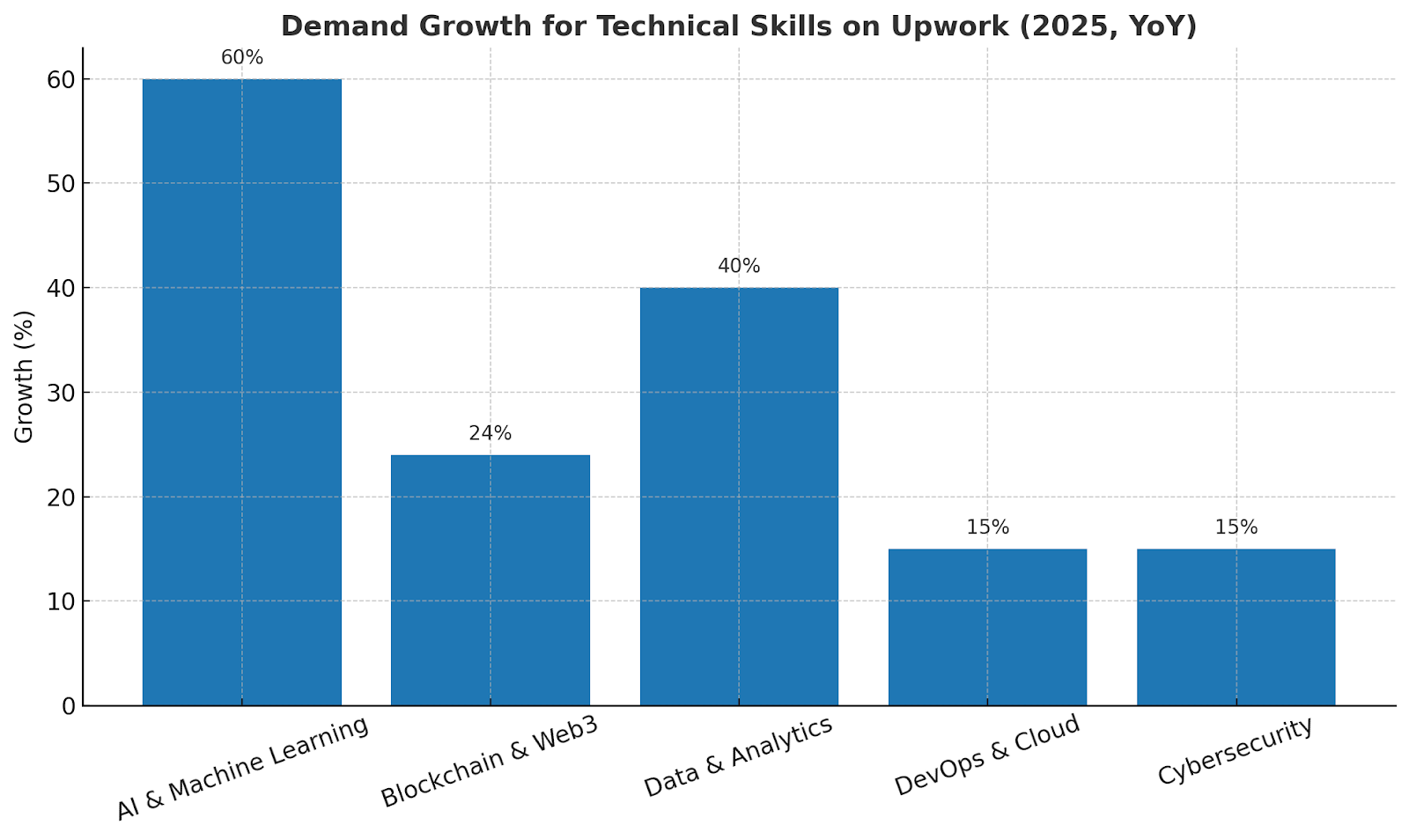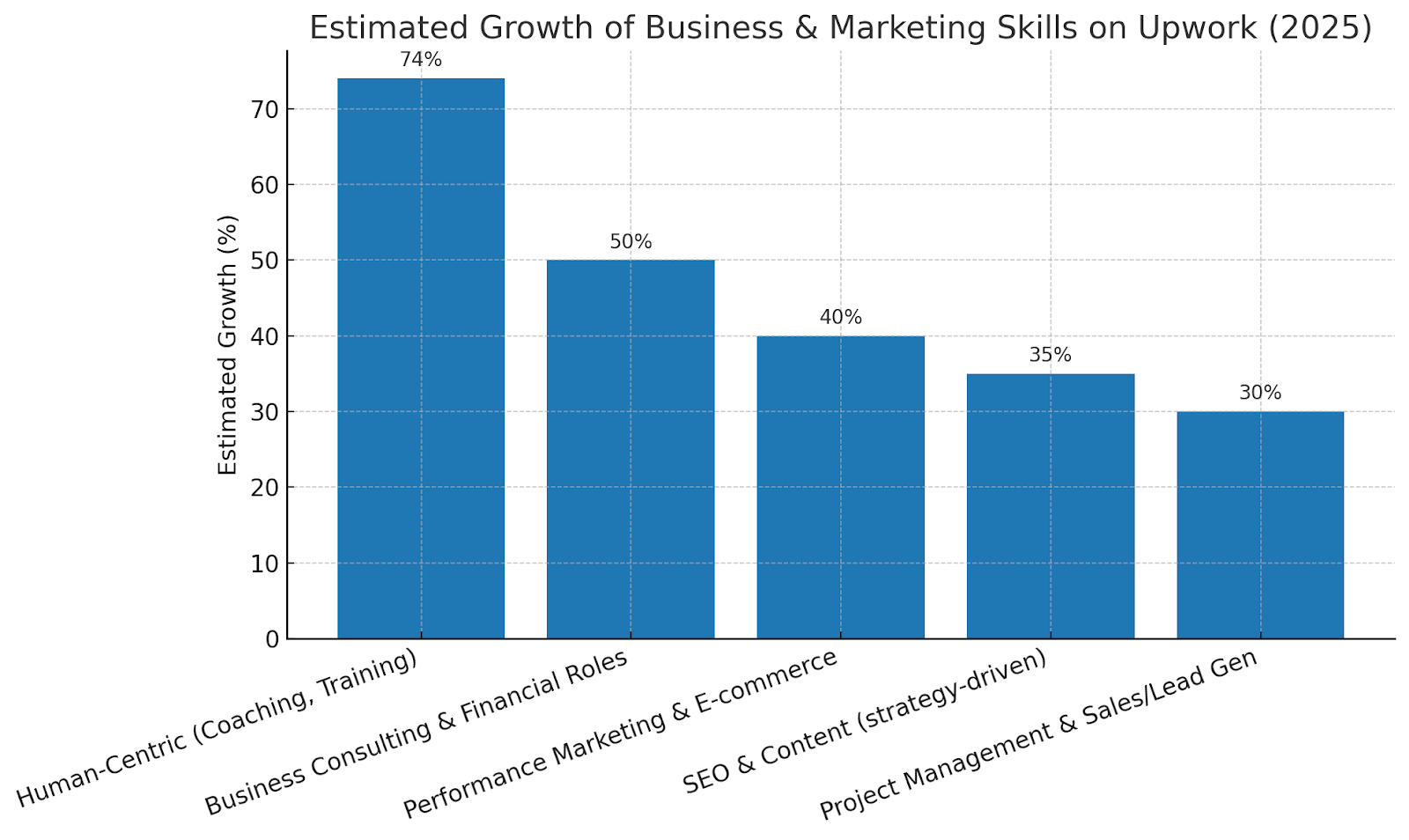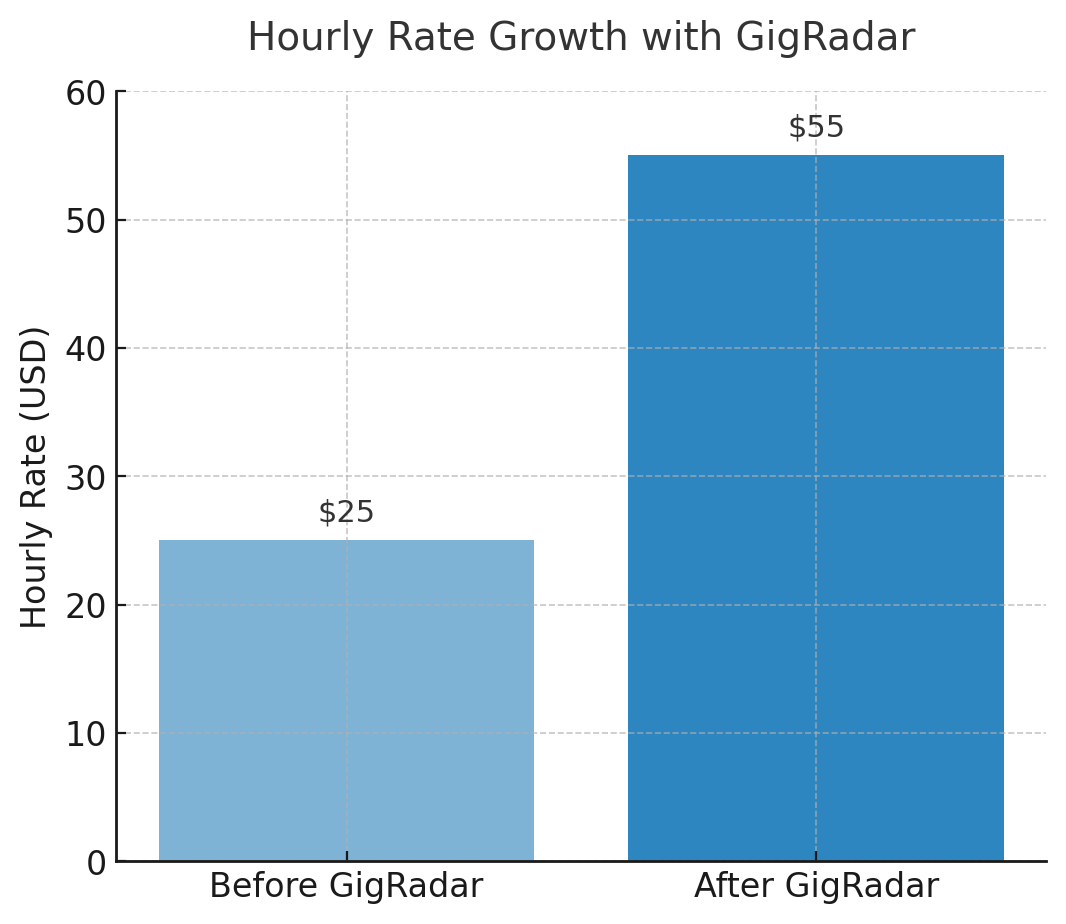Getting noticed on Upwork in 2026 isn’t just about having a profile; it’s about showing proof that you can do the work. One of the fastest ways to do that today is through Upwork Skills Certifications. They act like a stamp of trust: clients see them and instantly know you’re not just listing skills, you’ve been verified.
For freelancers and agencies, this means more visibility in searches, stronger profiles and often a higher response rate from clients; think of certifications as a way to stand out in a crowded marketplace, especially when new talent is joining the platform every day.
In this article, we’ll break down how certifications work, why they matter, which skills are most in demand in 2026 – and how you can use them to make your profile more than just another name in the feed.
What Are Upwork Skills Certifications?
When people talk about upwork skills, they usually mean the list you put on your profile. But certifications are different. These are official verifications that confirm you can actually do what you say. Upwork partners with testing providers and top companies to make sure only skilled freelancers get them. They show up as a badge on your profile and help you stand out in search results.
In 2024, around 5,000 freelancers were assessed for an Upwork Skills Certification – and only about 49% passed, reflecting the program’s selectivity and high standards.

For clients, it’s a quick signal of trust. For freelancers, it’s proof you’re not just listing random skills – you’ve been vetted for them.
Once you know what Upwork Skills Certifications are, the next question is: are they really worth it? Let’s break it down.
Benefits of Upwork Skills Certification for Freelancers
Once you’ve figured out what Upwork Skills Certifications are, it’s worth asking: why should freelancers care?
First off, the badge gives your profile a spotlight effect. It's lift your visibility in searches, especially when clients filter by expertise or certifications.
Plus, certifications save time. Instead of writing pages to prove your React skills, the badge does that for you. Clients get the signal immediately and can move to the meaningful part: talking scope and fit.
Across platforms, verified credentials matter. Academic research (even outside Upwork) shows that sharing certificates increases job responses by up to 8 %, and improves profile engagement significantly – meaning being certified can lead to more views or inquiries.
So yes, the real upwork certification benefits go well beyond looking good; they deliver real efficiency, credibility, and reach.
How Skills Certifications Improve Your Upwork Profile for Beginners
If you’re new to Upwork, early visibility is your biggest hurdle – and certifications can help you cross it.
For someone building an Upwork profile, the badge signals you meet a standards bar, even with few jobs completed. Clients see it and think: “they passed a test, they must know what they’re doing.”
Research on credential sharing shows early trust gains. In one study, learners who displayed credentials saw their job opportunities double compared to those who didn’t.
In practice, this means you’re no longer just one of 100 new freelancers. You become one of few with a verified skill – something that can make the difference between getting an interview or being overlooked.
And while certifications build trust, it’s just as important to protect it. Scams still exist on Upwork in 2026, often targeting beginners who may not know the red flags. To stay safe, check our full breakdown here: Upwork Scams – What to Watch Out For.
From here, the next step is looking at which skills are worth certifying. So let's continue.
Upwork Skill List: Most In-Demand Skills in 2026
Every year the demand on Upwork shifts, but in 2026 the trend is clear: clients are looking for freelancers who can combine technical depth with creativity and business awareness. The upwork skill list isn’t just a random collection of keywords – it’s the signal clients use to filter thousands of profiles. Choosing the right ones for your profile can directly affect how often you appear in search and how many invites land in your inbox.
Let’s break down where the demand is strongest this year.
Technical Skills on Upwork
Tech still dominates hiring volume. With AI, cloud, and automation at the center of most projects, these are the skill in upwork categories clients filter for daily:
• AI & Machine Learning – Python, TensorFlow, NLP, and AI model fine-tuning.
• Blockchain & Web3 – smart contract auditing, dApp development, Solana/Ethereum skills.
• Data & Analytics – SQL, Power BI, Google BigQuery.
• DevOps & Cloud – AWS, Kubernetes, Docker, CI/CD pipelines.
• Cybersecurity – penetration testing, SOC monitoring, compliance audits.

For agencies or solo freelancers – having one of these on your profile instantly places you in the shortlist for high-budget projects.
Creative Skills on Upwork
Creativity continues to pay. In 2026, design is not just about visuals, but about brand identity and content that moves fast. Among the top skills upwork clients hire for:
• UX/UI Design – Figma, prototyping, user flows.
• Video Editing & Motion Graphics – TikTok/Reels editing, After Effects.
• Copywriting & Content Strategy – SEO-aligned, AI-assisted but human-refined.
• Brand Design – logo systems, style guides, digital branding.
• 3D & AR/VR Assets – Unity, Blender, Unreal for gaming and immersive media.

By the way, creative demand is actually accelerating: in Q2 2026, job postings for writers, designers, and video editors surged 25.2%, as clients push back against generic AI content and look for human-led originality. Creative professionals with measurable results (engagement, CTR, conversion) stand out most.
Business and Marketing Skills
Business growth is always in demand, and the list of skills on upwork in this area reflects the shift to performance-driven marketing:
• Performance Marketing – Google Ads, Meta Ads, TikTok Ads.
• SEO & Content Marketing – technical SEO, link building, content funnels.
• E-commerce Management – Shopify, WooCommerce, product feeds.
• Project Management – Agile, Scrum, Notion/Trello workflows.
• Sales & Lead Generation – LinkedIn outreach, CRM automation, cold email systems.

Upwork’s own 2026 skills report highlights that financial modeling, business consulting, bookkeeping, and recruiting are among the fastest-growing business skills on the platform, showing that clients want direct revenue impact from freelancers. These skills form the backbone of agencies operating on Upwork, since they connect technical and creative execution directly to business outcomes.
Step forward: Knowing what’s in demand is one thing. The next question is how to choose the right skill for upwork so that it matches both market need and your personal experience. That’s what we’ll cover in the next section.
How to Choose the Right Skill for Upwork
Picking the right skill for Upwork is about what you already know and about aligning with where demand is moving. In 2026, the platform has become far more competitive, and clients are quick to filter profiles by verified skills or by categories where hiring volume is growing. That means the decision of what you highlight on your profile is almost as strategic as the work you deliver.
The question then is: do you pick based on where the market is hottest right now, or do you anchor to what your portfolio already proves? Let’s look at both sides – the demand clients are showing and the strengths you bring to the table.
Matching Skills to Market Demand
The easiest mistake is to list every tool you’ve ever touched. A smarter move is to match your skills with what clients are actively searching for. The upwork list of skills that dominate in 2026 shows heavy growth in AI-related services, video and short-form content, and e-commerce management.
For example, postings for AI/ML work have seen double-digit growth year over year, while demand for video editors grew by more than 20% last quarter alone. Watching these trends gives you a clearer picture of where to invest your learning hours. If you already know Python, adding TensorFlow or NLP to your stack puts you in a high-visibility category. If you’re a designer, moving from static graphics to short-form video editing or AR assets immediately broadens your reach.
The key isn’t to chase every trend, but to anchor yourself in categories where clients are clearly increasing spend.
Matching Skills to Your Experience and Portfolio
At the same time, you don’t want to pick skills that you can’t back up with real work. Upwork’s algorithms may get you seen, but clients still look at your portfolio and recent contracts before sending an invite. This is where alignment matters. If you already have a background in project management – leaning into Agile workflows or CRM automation makes more sense than starting from scratch in blockchain development. For creatives, the same applies: if your past projects show strong branding work, it’s natural to expand into style guides or UX rather than jumping straight into 3D animation.
The right skill is the one that meets in the middle; it has proven demand on the platform and it connects to your existing strengths so you can deliver without hesitation. That combination keeps your profile competitive and trustworthy, which is ultimately what makes clients click “invite.”
How to Pass Upwork Certification
When you’re looking at an Upwork skills test, the goal isn’t just to pass – it’s to prepare in a way that makes the badge valuable once it’s on your profile. Certifications are selective, and clients know that not everyone gets through. Treating it casually is what usually leads to failed attempts. What really matters is building a prep routine that mirrors how clients expect you to use the skill in real work. That’s where strategy comes in.
Preparing for the Upwork Skills Test
The first step is to know what’s being tested. Each certification has its own scope: coding tasks, case studies, or multiple-choice questions that reflect day-to-day client scenarios. Skimming through “general guides” won’t cut it – you need practice in the exact environment the skill belongs to. For example, if you’re testing for Python, get comfortable with coding challenges under time limits. If it’s Google Ads, set up sample campaigns with real data, not just theory.
Upwork often recommends third-party learning paths, and those are worth following, but you’ll get the best results by creating small projects that simulate real jobs. By doing this, you’re not only preparing for the test but also creating portfolio pieces you can show clients later.
Another overlooked point is timing. Many freelancers rush into a certification as soon as they see it available. A better approach is to block out focused study weeks, complete practice tests, and only apply when you consistently score above the required level. Passing becomes less stressful when you’ve already built confidence in practice runs.
Common Mistakes and How to Avoid Them
The most common reason freelancers fail their first attempt is rushing in too early. Many take the test the same week they discover it, without building a rhythm of practice. That usually ends with a second try a few months later. A better way is to treat the certification as a project in itself – give it space, prepare, and apply only when you already feel comfortable.
Another trap is focusing only on theory. Reading articles or watching YouTube tutorials can feel productive, but the tests are designed around real application. If you’re going for a coding badge, practice by writing actual scripts. If it’s marketing, run a demo campaign and learn how the reporting works. The test won’t ask for definitions – it will ask for decisions, just like a client would.
Time pressure is another factor that catches people off guard; even skilled freelancers sometimes stumble because they spend too long on one question and then rush the rest. So, practicing with a timer or doing mock runs helps you build that pace so the real test feels natural.
Finally, the biggest mistake is forgetting the bigger picture. Passing the test is important – but the value comes from how clients see that badge on your profile. When you prepare, think not only about answering the exam but also about how the skill connects to projects you want to land. That way, your certification works both as proof and as part of your positioning.
Next, once you’ve passed, the real question is how you use that badge in your profile. That’s where showcasing skills properly becomes the key, and we’ll cover that in the next section.
Best Practices to Showcase Your Skills on Upwork
Having certifications is one thing, but how you present them inside your profile makes all the difference. In 2026, clients scroll through dozens of freelancers in a matter of minutes, and small details decide whether you get opened or skipped. That’s why showcasing skills is also about structuring your profile so each part reinforces credibility.
Let’s look at two areas that make the biggest impact: how you optimise the profile itself, and how you use your portfolio to show real proof of expertise.
Optimising Your Profile to Highlight Skills
Your profile is where everything starts. Even if you hold certifications, they won’t do much if the rest of your page looks unfinished. A simple way to optimise is to lead with your strongest upwork skills in the title and headline. Clients skim fast, so you want your top expertise visible without them scrolling.
Descriptions should connect skills with outcomes, not just tools. Instead of writing “Proficient in Google Ads,” write “Managed $50k in monthly ad spend with 20% CTR growth.” This makes your profile read like proof of impact, not just a list of platforms you’ve touched. Also, don’t forget the “skills” tags. Upwork’s search heavily relies on them, and missing a tag can keep you out of filtered results where the right clients are looking.
A polished profile photo, consistent rate, and a short, client-focused overview round out the impression. The goal is to get clients to click and read further.
Using Portfolio and Case Studies to Prove Expertise
Certifications get you noticed, but portfolios close the gap. Case studies are especially powerful in 2026 because clients expect context. Screenshots of dashboards or design mockups are good, but pairing them with a short breakdown of the challenge, process, and outcome makes them far more convincing.
If you don’t have paid projects yet, create small simulated ones. For example, set up a mock e-commerce store and run test ads, or build a sample app to demonstrate coding skills. Many freelancers underestimate how much even a small but well-presented project can sway client decisions.
The combination of certified skills plus a portfolio creates a strong double signal. One shows you’ve been vetted, the other proves you can apply it. Together, they turn your profile into a filter-breaker – you’re no longer just one of many, but one of the few with verified expertise and visible results.
And once your profile looks solid, the next step is making sure those skills actually work for you behind the scenes. In 2026, more freelancers are leaning on automation to keep proposals, reporting, and even skill showcases running smoothly. That’s where we’ll head next.
Boost Your Certified Skills with GigRadar
Certifications help you stand out, but what really scales your freelancing is how you manage the work behind them. Sending proposals, tracking invites, and keeping your pipeline full can take hours every week. Automation is what turns that grind into a system that keeps running while you focus on delivery.
A good example comes from Mariia at Alaska CGI. She started as a solo 3D rendering freelancer, earning around $5k a month. Once she connected GigRadar into her workflow, she began landing 15+ matched projects a month, doubled her hourly rate from $25 to $55, and built a team that now runs a $40k agency. The biggest shift wasn’t just the new work – it was the ability to stop chasing every client manually and say “no” to the wrong ones.

👉 You can check the full breakdown of her process and setup here: How a 3D Rendering Studio Grew from Solo Freelancing to a $40k Agency with GigRadar
If you’ve invested in certifications and built a solid profile, the next logical step is to make sure every hour you put in compounds. That’s where we come in. Ready to see how your certified skills can work harder for you? Reach out – let’s talk about scaling your workflow.




.avif)
.png)
.webp)
